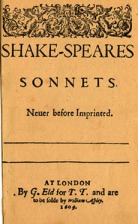"The Darling Buds of May
 Four hundred years ago today, on the 20th May 1609, William Shakespeare published a collection of 154 Sonnets which arguably represent just as high a level of literary achievement as his plays. At any rate they’ve survived in popularity just as well and also furnished a huge number of memorable phrases including, appropriately enough for the time of year, the title of this post. This was, in fact, the only edition of the Sonnets published in Shakespeare’s lifetime and the circumstances of its publication remain uncertain.
Four hundred years ago today, on the 20th May 1609, William Shakespeare published a collection of 154 Sonnets which arguably represent just as high a level of literary achievement as his plays. At any rate they’ve survived in popularity just as well and also furnished a huge number of memorable phrases including, appropriately enough for the time of year, the title of this post. This was, in fact, the only edition of the Sonnets published in Shakespeare’s lifetime and the circumstances of its publication remain uncertain.
Most of the poems concern Shakespeare’s love for a young man, ”Mr WH, the Onlie Begetter of the Sonnets”. However, there is a also group of sonnets addressed to his mistress, an anonymous “dark lady”, which are far much more sexual in content than those addressed to the “Fair Youth”. The usual interpretation of this is that Shakespeare’s love for the boy was purely Platonic rather than sexual in nature. Anyway, it was certainly a physical attraction. Verse after verse speaks of the young man’s beauty. The first group of sonnets even encourage him to get married and have children so his beauty can continue and not die with his death. Sonnet 20 laments that the youth is not a woman, suggesting that this ruled out any sexual contact. These early poems seem to suggest a slightly distant relationship between the two as if they didn’t really know each other well. However, as the collection goes on the poems become more and more intimate and it’s hard for me to accept that there wasn’t some sort of involvement between the two. Although homosexual relationships were not officially tolerated in 17th Century England, they were not all that rare especially in the theatrical circles in which Shakespeare worked.
We’ll probably never know who Mr WH was – not Smith presumably – or indeed what was the real nature of his relationship to Shakespeare but we still have the poems. I do think it’s worth remembering, though, that these deep and moving expressions of romantic love were not written from a man to a woman, but from one man to another. Here is perhaps the most famous one of all, Sonnet 18
Shall I compare thee to a summer’s day?
Thou art more lovely and more temperate:
Rough winds do shake the darling buds of May,
And summer’s lease hath all too short a date;
Sometime too hot the eye of heaven shines,
And often is his gold complexion dimm’d;
And every fair from fair sometime declines,
By chance or nature’s changing course untrimm’d;
But thy eternal summer shall not fade,
Nor lose possession of that fair thou ow’st;
Nor shall Death brag thou wander’st in his shade,
When in eternal lines to time thou grow’st:
- So long as men can breathe or eyes can see,
- So long lives this, and this gives life to thee."







































No comments:
Post a Comment